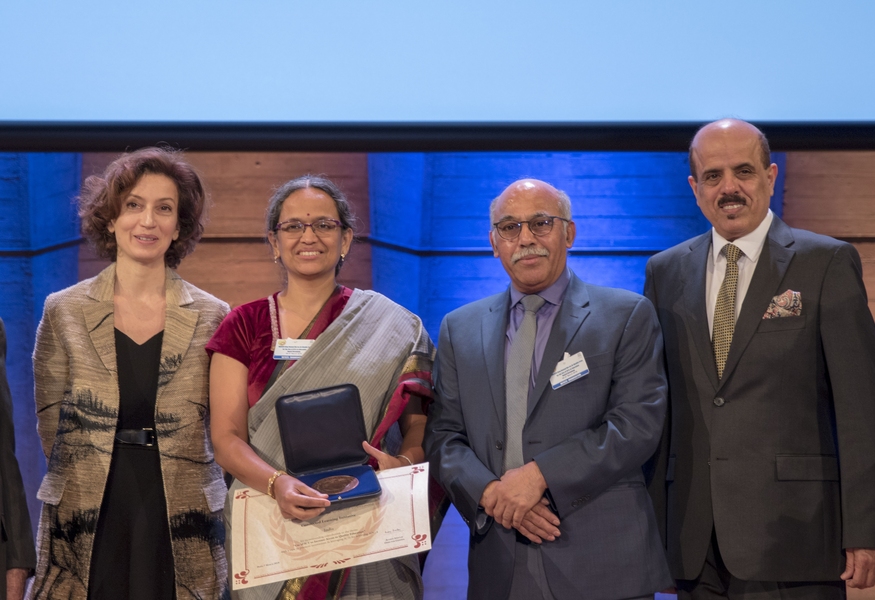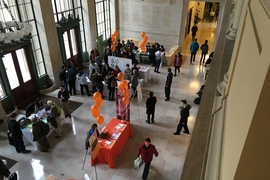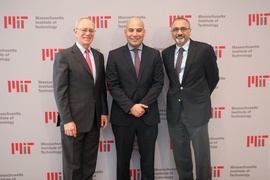UNESCO has awarded the 2017 King Hamad bin Isa Al-Khalifa Prize for the Use of Information and Communication Technologies in Education to the Connected Learning Initiative (CLIx), a collaborative effort between MIT Open Learning and the Tata Institute of Social Sciences and the Tata Trusts in India. The award recognizes innovations in leveraging information and communication technologies (ICTs) to increase access to quality education.
The UNESCO jury selected CLIx from a pool of 900 competing submissions for its approach and its effectiveness in breaking down socioeconomic and geographic barriers to education through the innovative use of technology. The award selection process assessed every aspect of the work — overall design, pedagogical approach and content (student and teacher modules), technology, research, and implementation.
“It is at once humbling, gratifying, and energizing to receive this award from UNESCO,” says Vijay Kumar, associate dean for open learning and principal investigator of the project. "It is a testament not only to the tremendous efforts of the team at MIT, but also the remarkable contribution of the team at TISS in India. And it speaks to the strength of the collaboration without which so much progress on this complex initiative could not have been realized. It takes a village — an ecosystem of collaborating organizations focused on a systemic effort to bring about any meaningful positive change in education.”
The UNESCO prize was established in 2005 to encourage the development of new educational opportunities through the application of open learning technologies. The annual competition is funded by the Kingdom of Bahrain, and each year it focuses on a unique theme based on the innovative use of ICTs. The 2017 theme, the use of ICTs to increase access to quality education, was chosen to encourage the development of educational opportunities for socioeconomically disadvantaged learners.
“CLIx has been a fabulous example of what international collaborations can do to make a difference in educational systems,” says Professor Eric Klopfer, the co-PI of the project. “Together we have worked on pedagogy, teacher development, school systems, government support, capacity development, and of course technology. There are so many systems that we must consider to effectively create change. We are now starting to see the positive impacts of this collaboration and multifaceted approach. It’s very rewarding. We hope that our efforts continue to have an impact on the communities we’re working in, as well as others who adopt a similar model.”
Tata Trusts Managing Trustee R. Venkataramanan adds: “UNESCO’s award to the Connected Learning Initiative reaffirms Tata Trust’s vision of building lasting solutions to complex educational challenges. This is only possible through national and international collaborations and meaningful use of technology. CLIx exemplifies principles of innovation, collaboration, and openness. We remain committed to working with multiple stakeholders to scale to foster quality and equity in education.”
The development of blended learning programs and innovative utilization of education technologies such as CLIx could provide much needed solutions for countries such as India, where providing high-quality learning experiences at scale has been a significant challenge despite great strides in literacy and enrollment rates in primary and secondary schools.
“CLIx has been designed to harness technology to enhance constructivist learning — getting students to think, solve problems, explore, interact and collaborate and involving teachers in developing their pedagogy for active learning,” says Professor Padma Sarangapani, the chairperson of the Center for Education Innovation and Action Research at the Tata Institute of Social Sciences and project leader of CLIx. “This is the curriculum transformation that the Indian education system needs, at scale, envisioned in the National Curriculum Framework 2005. The enthusiasm of students to learn through exploration and of teachers who are learning to integrate ICT into their subject teaching, and of the state governments of Mizoram, Rajasthan, Telangana, and Chhattisgarh, who are happy to see the ICT@School labs being maintained and used by students, has been a great source of motivation for us. Our resources and practices for implementation are being shared with the National Teachers’ Platform which was launched last year by the MHRD and NCTE, so that they can reach all teachers and students.”
Available in Hindi, Telugu, and English, CLIx’s blended learning experiences are designed to augment traditional secondary school coursework for students from traditionally underserved rural schools in four of India’s states. First used in schools in January 2016, the program is delivering 15 STEM and English courses to 460 schools, 2,000 teachers, and 35,000 students, with a goal of doubling the number of students in 2018-2019.
MIT’s expertise in designing and developing innovative pedagogy and applications of open learning technology helped CLIx’s designers answer India’s call to improve the quality of public education. By partnering with local organizations, MIT Open Learning, the Tata Trust, and the Tata Institute of Social Sciences incorporate local knowledge into the development of open educational resources. With guidance from MIT and others, CLIx provides highly engaging and interactive learning experiences that teach knowledge, skills, values, and professionalism.
“Just as with OpenCourseWare and the recently launched Jameel World Education Lab (J-WEL), CLIx exemplifies MIT’s commitment to influencing and extending quality education around the world through open and innovative educational practices. We are thankful to the Tata Trusts for supporting us in this journey and pleased to receive this award recognizing this collaborative initiative,” says Professor Sanjay Sarma, vice president for open learning.
The CLIx platform has been developed to deliver educational content to learners, support professional development, and enable research. The platform utilizes Open edX, the open source platform that powers edX courses, founded by MIT and Harvard University in 2012. MIT has contributed a collection of open source tools and applications to support CLIx learning experiences. The platform supports data collection and analysis capabilities used to foster evidence-based decision-making practices that inform program design as well as policymaking, and funding.
“This honor is also an incentive to continue to look for innovative solutions to address the important goal of providing universal quality education,” Kumar says. “We hope that the project’s commitment to openness, connectedness, and pedagogical principles will serve as useful model for educational change at scale, in India and around the world.”
Over the last four years, the MIT program team has included: Kirky DeLong, Colin Greenhill, Jennifer Groff, Brandon Hanks, Ling Hsaio, Kathleen McMahon, Jeffrey Merriman, Scot Osterweil, Judith Perry, Louisa Rosenheck, Rita Sahu, Cole Shaw, Glenda Stump, Angie Tung, Claudia Urrea, and Brandon Muramatsu (project director).











